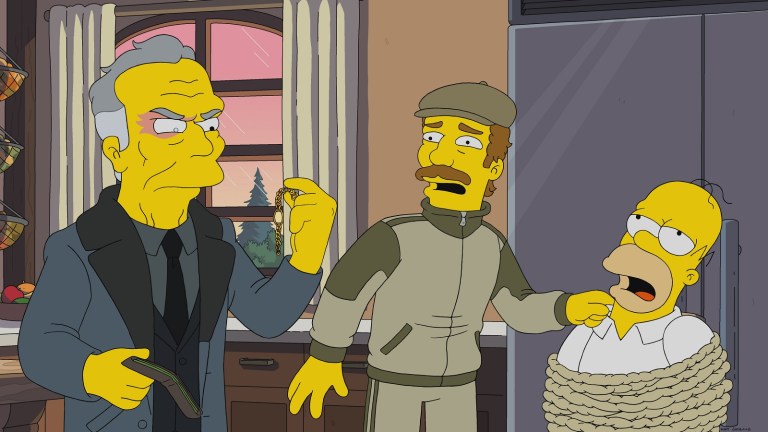The Simpsons Season 33 Episode 6 Review: A Serious Flanders (Part 1)
The Simpsons return to form with a spot-on spoof of Fargo in season 33, episode 6, “A Serious Flanders.”

This The Simpsons review contains spoilers.
The Simpsons Season 33 Episode 6
The Simpsons, season 33, episode 6, is proof the series’ installments should be given more room to breathe. The first of a two-part episode takes the time to fill most of the space with laughs. “A Serious Flanders” is a spoof of the FX series Fargo, and the takeoffs are immersive. This is one of the deepest dives into the core of a known series The Simpsons has made in a long time.
The episode is brought to you by Simpflix, and it opens on the channel’s landing page, which is also offering such shows as “What We Lou in the Shadows,” “The Tween’s Gambit,” “The Marvelous Mrs. Muntz,” “Halt or Kirk’s Fired,” “Bee-Jack Horseman,” “Molemen,” and “Somebody Feed Gil.” They are all obviously starring local characters from Springfield, and some might even be worthy of another FX spoof. But only if they remain at this level of comedy.
Like Fargo, “A Serious Flanders” presents a true story, which is technically correct in the dictionary sense, while still being open to interpretation. But the disclaimer is a wonderful twist on the skewered realities presented by the source material. “The events depicted took place in a real animated town,” we read after the dark demise of the Rich Texan. “Out of respect for the dead, the whole thing has been entirely made up. The rest has been told as pretentiously as possible.”
This is possibly mostly referring to the Minnesota/Wisconsin accents emanating from Ned’s memory of his lost paw-paw, Sheriff Ned Flanders I (Timothy Olyphant), who is a dead ringer for almost every male law enforcement agent on Fargo. But also in Ned’s love interest, Barb, played with an exquisitely quirky twist by Cristin Milioti. Quirks mean a lot on Fargo, whether it’s how many times someone might knock on a door before opening it, or bulimic capitalists. Ned has a few quirks of his own, mainly in how he speaks when excited, and it is well-utilized in “A Serious Flanders.” Great golly, Miss Molly, their sex scene is one of the funniest bits The Simpsons has tossed away in seasons, and has Sideshow Mel as a sad and somehow sordid punchline.
The first thing we learn in Chapter One: “The Harder The Good,” is that no character is safe. We’ve already seen what the villains do to barely beloved characters like Rich Texan. The sequence where henchmen Seamus (Chris O’Dowd) and Collette (Jessica Paré) cut up his body is quite grisly, but turns hysterical as the finer meat goes through a deli slicer. This tells us that debts are traditionally collected in money or blood. But it is revealed that a much more daunting alternative has been added to the collection plate, Venmo. We also learn that Rich Texan’s real name is Richard Texan.
Homer also gets an edumacation. He probably won’t fully understand it until the end of the closing episode, and certainly won’t retain it past this non-canonical series entry, but it is unavoidable. He rolls into it moments after Ned Flanders finds the bag of money which will make for the center of the action. A good man finds a goodie bag which will help him do good things. For Homer, it is “proof that karma is real, which sucks, cos now I can’t club you over the head and take it.” Ned seems to truly appreciate that and pays the not-quite-so-good deed forward. If we’ve learned nothing from watching Fargo, we should at least know, no deed goes unpunished, good or bad.
Ned donates the money anonymously, under his grandfather’s name, Ned Flanders I, so no one knows it’s him. When the kids chant “Ned’s number one,” they’re not technically wrong. So, Ned continues to be unanimously anonymous, getting quite a lot of attention for his humility. But in his heart, he is still committing the sin of pride. This brings the episode to Chapter 2, “The Hippo’s Conundrum.” It’s not only the misgivings which are testing Ned’s faith, but the shady characters who reveal themselves. It also reveals Marge to be quite an expert amateur sleuth, something Fargo can never get enough of.
Part of the reason the episode works so well is due to how closely the writers follow the canon of both shows. Fargo has often made fair use of mistaken identity, and always provides a reasonable explanation for the initial mix-up. It has been long established that Homer has been liberally borrowing Ned’s possessions. He is renowned for not returning anything, and not even bothering to cover it up. This has extended far beyond the obvious lawn mowers, camcorders, toothbrushes, weather vanes, and air conditioning units to electricity, cable, and satellite TV access. This comes to its least obvious conclusion tonight as we learn even the undershirt Homer is wearing has Ned’s name on it. We can’t fault the henchmen, Seamus and Collette, who mistake one Evergreen Terrace resident for another.
But Comic Book Guy can find fault in everything, and his appearance in this episode is a flawless example of why he is such a necessary accessory to any crime. He has sport with Seamus’ accent and considers the “silent but violent” sidekick to be another tired cliché. He amends that when Collette puts a blade through his man-bun, and utters her own threat. “Actually, a French accomplice, unexpected but still underwhelming,” Comic Book Guy critiques. It is all perfectly and hysterically within character, mood, and rhythm.
Not that we should be surprised, he runs a collectible store for comics and games, but Comic Book Guy also provides in the final puzzle piece for any Fargo scenario: A rival gang. Comic Book Guy pays Fat Tony (Joe Mantegna) for protection, and Springfield only has room for so many meatballs. Kostas Becker, voiced by Brian Cox, prefers his edibles to be circular, like the threats the town mob boss enjoys serving. Everything leads up to a giant massacre, which is an amazing sequence, revelatory and suspenseful.
Kostas turns out to be just as dangerous as Homer pegged him, and equally weird. He likes to tell rambling parables. It’s a quirk of his he picked up watching Fargo, and he does not like to be interrupted until their conclusions. The ending is a cliffhanger, and we are all emotionally engaged. “A Serious Flanders,” written by Cesar Mazariegos, and directed by Debbie Mahan, is an installment even non-Simpsons watchers will like. It is detailed, nuanced, and overloaded with jokes or their ghosts. Because the rules of character continuity are suspended, Part II should provide a satisfying conclusion.


